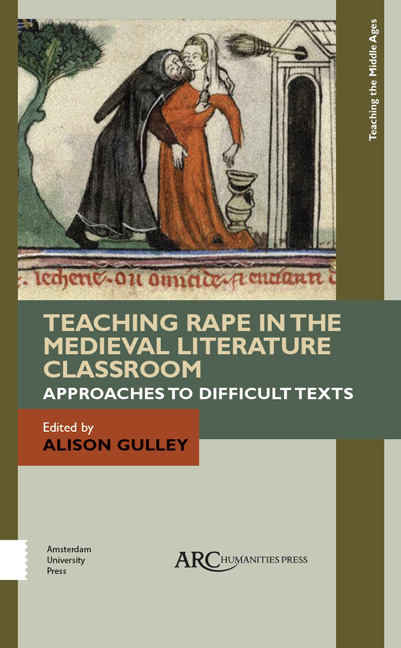Book contents
- Frontmatter
- Contents
- Acknowledgements
- Chapter 1 Introduction: Teaching Rape and Meeting the Challenges of the TwentyFirstCentury Classroom
- Chapter 2 Medieval Saints and Misogynist Times: Transhistorical Perspectives on Sexual Violence in the Undergraduate Classroom
- Chapter 3 Teaching Medieval Rape Culture across Genre: Insights from Victimology
- Chapter 4 Bringing the Bystander into the Humanities Classroom: Reading Ancient, Patristic, and Medieval Texts on the Continuum of Violence
- Chapter 5 From Bystander to Upstander: Reading the Nibelungenlied to Resist Rape Culture
- Chapter 6 Speech, Silence, and Teaching Chaucer’s Rapes
- Chapter 7 Classroom PSA: Values, Law, and Ethics in “The Reeve’s Tale”
- Chapter 8 “How do we know he really raped her?”: Using the BBC Canterbury Tales to Confront Student Skepticism towards the Wife of Bath
- Chapter 9 Teaching the Potiphar’s Wife Motif in Marie de France’s Lanval
- Chapter 10 Sexual Compulsion and Sexual Violence in the Lais of Marie de France
- Chapter 11 Troubadour Lyric, Fin’amors, and Rape Culture
- Chapter 12 The Knight Coerced: Two Cases of Raped Men in Chivalric Romance
- Chapter 13 Teaching Rape to the HeMan Woman Haters Club: Chrétien de Troyes at a Military School
- Chapter 14 Rape, Identity, and Redemption: Teaching “Sir Gowther” in the Community College Classroom
- Notes on Contributors
- Index
Chapter 11 - Troubadour Lyric, Fin’amors, and Rape Culture
Published online by Cambridge University Press: 23 January 2021
- Frontmatter
- Contents
- Acknowledgements
- Chapter 1 Introduction: Teaching Rape and Meeting the Challenges of the TwentyFirstCentury Classroom
- Chapter 2 Medieval Saints and Misogynist Times: Transhistorical Perspectives on Sexual Violence in the Undergraduate Classroom
- Chapter 3 Teaching Medieval Rape Culture across Genre: Insights from Victimology
- Chapter 4 Bringing the Bystander into the Humanities Classroom: Reading Ancient, Patristic, and Medieval Texts on the Continuum of Violence
- Chapter 5 From Bystander to Upstander: Reading the Nibelungenlied to Resist Rape Culture
- Chapter 6 Speech, Silence, and Teaching Chaucer’s Rapes
- Chapter 7 Classroom PSA: Values, Law, and Ethics in “The Reeve’s Tale”
- Chapter 8 “How do we know he really raped her?”: Using the BBC Canterbury Tales to Confront Student Skepticism towards the Wife of Bath
- Chapter 9 Teaching the Potiphar’s Wife Motif in Marie de France’s Lanval
- Chapter 10 Sexual Compulsion and Sexual Violence in the Lais of Marie de France
- Chapter 11 Troubadour Lyric, Fin’amors, and Rape Culture
- Chapter 12 The Knight Coerced: Two Cases of Raped Men in Chivalric Romance
- Chapter 13 Teaching Rape to the HeMan Woman Haters Club: Chrétien de Troyes at a Military School
- Chapter 14 Rape, Identity, and Redemption: Teaching “Sir Gowther” in the Community College Classroom
- Notes on Contributors
- Index
Summary
The term “rape culture” was coined relatively recently, but its salient features are perceptible throughout history. Definitions vary, but most critics describe it as a culture in which people consider rape a “fact of life,” a society that implicitly or explicitly promotes sexual violence. First applied to all of American society by secondwave feminists in the 1970s, the notion has many detractors. Men's rights organizations believe feminism and political correctness have wrongfully transformed traditional forms of romance into excuses for manbashing; furthermore, they allege the judicial system overrides due process by favouring victims’ rights over those of the accused. Others claim that the notion trivializes female sexual empowerment: ours is not a rape culture but a hookup culture in which both women and men seek “no strings” sexual relationships. Consequently, they argue, our ideas of what is considered socially acceptable must evolve. Even prominent feminists like bell hooks believe that rape culture must be analyzed within a broader culture of violence that disproportionately affects minorities, especially women and persons of colour.
Nowhere in American society is the term debated more hotly than on college campuses. Rape statistics have long met with skepticism: government and watchdog agencies rely on statistics voluntarily reported by institutions of higher learning, and underreporting has frequently been the norm due to some administrations’ allergic reaction to negative press. In September 2014, the Obama administration pushed university administrators to become more proactive in combating sexual violence by taking surveys of students’ attitudes and experiences and then charging faculty and staff to create programs to combat the problem. Much of the debate revolves around the issues of coercion and consent. Consent is a freely given, never assumed, agreement to engage in a sexual relationship with a person of equal power (thus students cannot consent to have sex with teachers or players with coaches); moreover, fear or social pressure must not be present, and the influence of drugs or alcohol nullifies any consent. Coercion, on the other hand, denotes the use of force or intimidation to obtain compliance, be it through emotional manipulation, implied or real threats in the form of psychological, verbal, or physical harm.7 Coercion and consent are, in short, mutually exclusive.
- Type
- Chapter
- Information
- Teaching Rape in the Medieval Literature ClassroomApproaches to Difficult Texts, pp. 151 - 163Publisher: Amsterdam University PressPrint publication year: 2018



